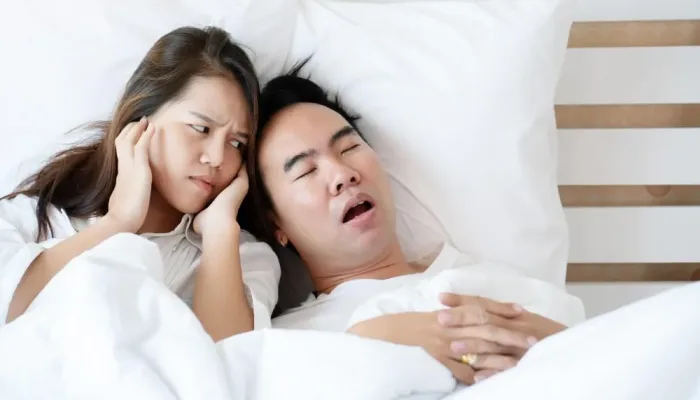- Home
- Sleep Apnea
Sleep Apnea
Sleep Apnea
Most People have probably heard about sleep apnea. “Sleep apnea” is a breathing disorder that occurs during sleep, as the name implies. Patients with sleep apnea may have their upper respiratory tracts blocked due to a variety of factors. Problems with the central nervous system can sometimes be the cause that disrupts a patient’s breathing command, resulting in repeated suffocation during sleep. As a result of the decreased oxygen level in the blood, patients would wake up and take normal breaths before falling back asleep. Patients’ health and energy levels throughout the day may suffer as a result of the illness, which makes it difficult for them to reach a deep sleep state and get enough rest.
As a result, patients may have headaches, fatigue, irritability, or even become easily agitated. In the worst-case scenario, the heart would beat quicker to compensate for the hypoxia caused by suffocation, putting more strain on blood vessels and the heart. Serious conditions like hypertension and heart disease will become more common as a result of this.

Types of Sleep Apnea
In general, Sleep Apnea can be divided into three types:
Obstructive sleep apnea
The majority of patients suffer from obstructive sleep apnea, which occurs when the soft tissues of the tongue or throat restrict the upper respiratory tract during sleep. Because air cannot get through, breathing is impaired, resulting in suffocation and a reduction in blood oxygen levels.
Central sleep apnea
Patients with central sleep apnea are unable to breathe and suffocate because the central nervous system is unable to communicate breathing instructions properly. The respiratory tracts of central sleep apnea patients are usually unobstructed, and they may not even snore when sleeping. Patients with a history of stroke or cardiovascular illness are more likely to develop this type of sleep apnea.
Complex sleep apnea
Patients with complex sleep apnea have both central and obstructive sleep apnea at the same time.
Symptoms of Sleep Apnea
Many people believe it is natural to snore while sleeping and are thus unaware of the seriousness of the problem. As a result, many patients were unaware that they suffered from sleep apnea. However, if you or a member of your family exhibits any of the following sleep apnea symptoms, you should get treatment immediately.
Sleep Apnea symptoms include:
- Serious nasal problems
- Suffocation while sleeping on a regular basis
- Difficult to concentrate and slow to respond during the day
- Sleepy, fatigued after getting up in the morning, feeling tired during the day, and prone to dozing off
- Memory deterioration
- Reoccurring headache in the morning
- Easily Depressed
- Lack of libido
- Frequent Urination during the night
High Risks Groups
The following people have a higher chance of developing sleep apnea:
- Male
- Obesity
- Large neck circumference
- Swollen tonsils
- Dislocation of the nasal bone, nasal polyps
- Have a large tongue
- Mandible that is receding or has a small size
- Has an addition to alcohol
- Smoking
- Tranquilizer users
Diagnosis of and Treatment For Sleep Apnea
If you think you might have sleep apnea, you should see a doctor and get a sleep test. Various instruments will be used to record biological data such as electroencephalogram, electrocardiogram, eye movement, blood oxygen concentration, and so on during the exam. The information will be used to assess your sleeping conditions, including whether you experience suffocation, the number and frequency of suffocations, and so on.
There are no medications available to treat sleep apnea at this time. Doctors may advise individuals with moderate symptoms to lose weight, sleep in a lateral posture, or use oral appliances for sleep apnea to reduce the risk of airway obstruction. Patients with more serious sleep apnea issues may need to take steps to improve their situation by using Continuous Positive Airway Pressure (CPAP) machines or undergoing surgeries.

